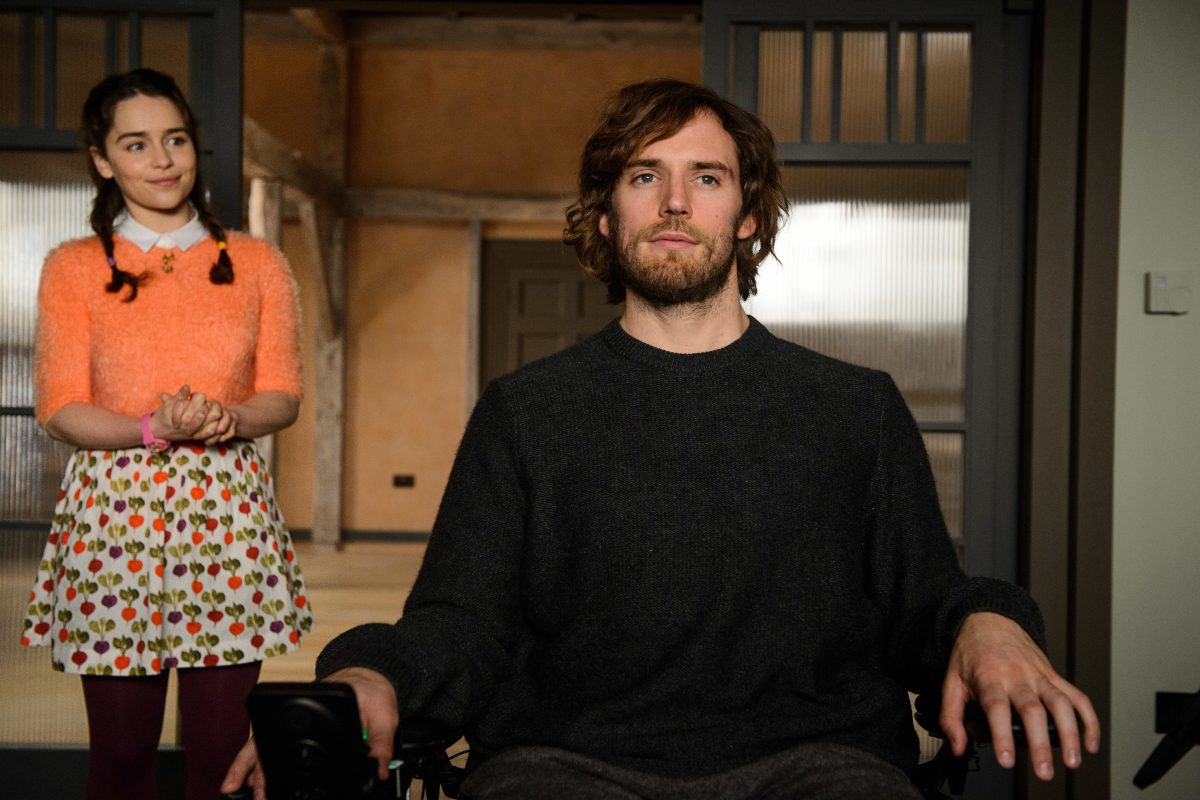
Based on the trailer alone, Me Before You seemed like a gift from the movie gods to those of us craving a sappy love story that would also provide a cathartic ugly-cry. (Yes, there are those of us who crave that. Don’t judge us.) The only remaining questions were: Would the lead actors have the appropriate chemistry? And would the romance itself be engaging and convincing enough to earn our tears?
At first, all seems to be moving along apace. Game of Thrones’ Emilia Clarke, dragon-free and sporting her natural brown hair, is delightful as Louisa “Lou” Clark, a working-class girl living in the English countryside who gets a job as a caretaker/companion for a wealthy young man named William (Sam Claflin), who was paralyzed in an accident two years earlier. Will had been a man about town—an entrepreneur, world traveler, and extreme sports enthusiast—and now he’s a quadriplegic, who spends most of his time sitting in his chair, looking sexily dessicated. Lou is one of those “breath-of-fresh air” types—chatty, smiley, and fond of wearing kitschy, colorful, Raggedy-Ann-esque outfits (she dreams of being a clothing designer). As such things always go, William is contemptuous of her at first but she slowly warms his heart. And although Lou has a nice-enough boyfriend (Harry Potter’s Matthew Lewis), it’s clear that she and William are meant to be together.
On a very basic level, Me Before You, which is ably directed by newcomer Thea Sharrock, does meet those requirements I set up above—Clarke and Claflin do, indeed, have chemistry and both are extremely easy on the eyes (he has dimples for DAYS)—and they fall in love in a believable, unforced way. So I can recommend it for that. But there are caveats.
My first objection to the film is more of a general weariness over the current state of romantic movies. As was also the case in 50 Shades of Gray and Twilight, our heroine here is a bit naïve, wide-eyed, and endearingly awkward (I have no idea why clumsiness has become the new standard trait for romantic heroines, but so it is) and our male lead is sophisticated, worldly, and eager to teach her new things. In 50 Shades, Twilight, and now here, the heroine’s tendency to knock stuff over, blurt out the wrong thing, be woefully unexposed to arts and culture and the way of the world (Lou has never seen a film with subtitles or gone to a classical music concert) is considered part of her charm—indeed, Will is utterly delighted by it. And although Will is about her age, he essentially “Henry Higgins” her as he falls in love. It all just feels so terribly condescending.
I could live with that until the film takes a very bizarre turn—and this involves spoilers. So before I move on, let me be perfectly clear: IF YOU DON’T WANT TO BE MASSIVELY SPOILED, DO NOT READ PAST THIS PARAGRAPH. I AM ABOUT TO SHARE THE ENDING.
[Last chance to stop reading!…]
So…turns out that William has contacted a center in Switzerland that aids people with assisted suicide. Memories of his former life only bring him grief; he’s in constant pain; and he hates being confined to his chair. His parents—played by the most formidably patrician duo to ever grace the screen, Charles Dance and Janet McTeer—beg him to wait six months before going through with it, which is exactly when they hire Lou. Eventually, Lou discovers the truth about Will’s plans and spends much of the latter part of the film trying to renew his lust for life: She takes him to a horse race, then to a resort hotel; she dances with him at a wedding, sitting in his lap as he twirls in his wheelchair. It’s during this period that Lou and Will admit their love for each and (possibly) make love—although if that did happen, it was off screen. And then…he kills himself anyway.
This is the very definition of problematic: First of all, I’m pretty sure that disability activists are going to bristle at the idea that paralysis means your life is over. Of course, it’s not a film’s responsibility to please activist groups, but it certainly does paint a rather depressing and hopeless picture of disability, especially considering that Will is rich, young, and handsome. What’s more, love is supposed to be one of those things that gives us a reason to live, certainly in a freaking romance movie. The idea that William could fall in love with Lou and then still decide to kill himself runs counter to the very essence of romance films—where love conquers all. (Lovers are supposed to be willing to die for each other, not in spite of each other.) Look, I could see this sort of existentially gloomy ending working in an indie film that more thoughtfully examined love and pain and euthanasia. But this isn’t that film. It’s a fairly shallow, formulaic love story—albeit it one that is slickly told. At the press screening I attended, promoters handed out boxes of Kleenex as you entered. But it’s hard to cry your eyes out over a sappy love story when one of the lovers doesn’t care enough to stay alive.
